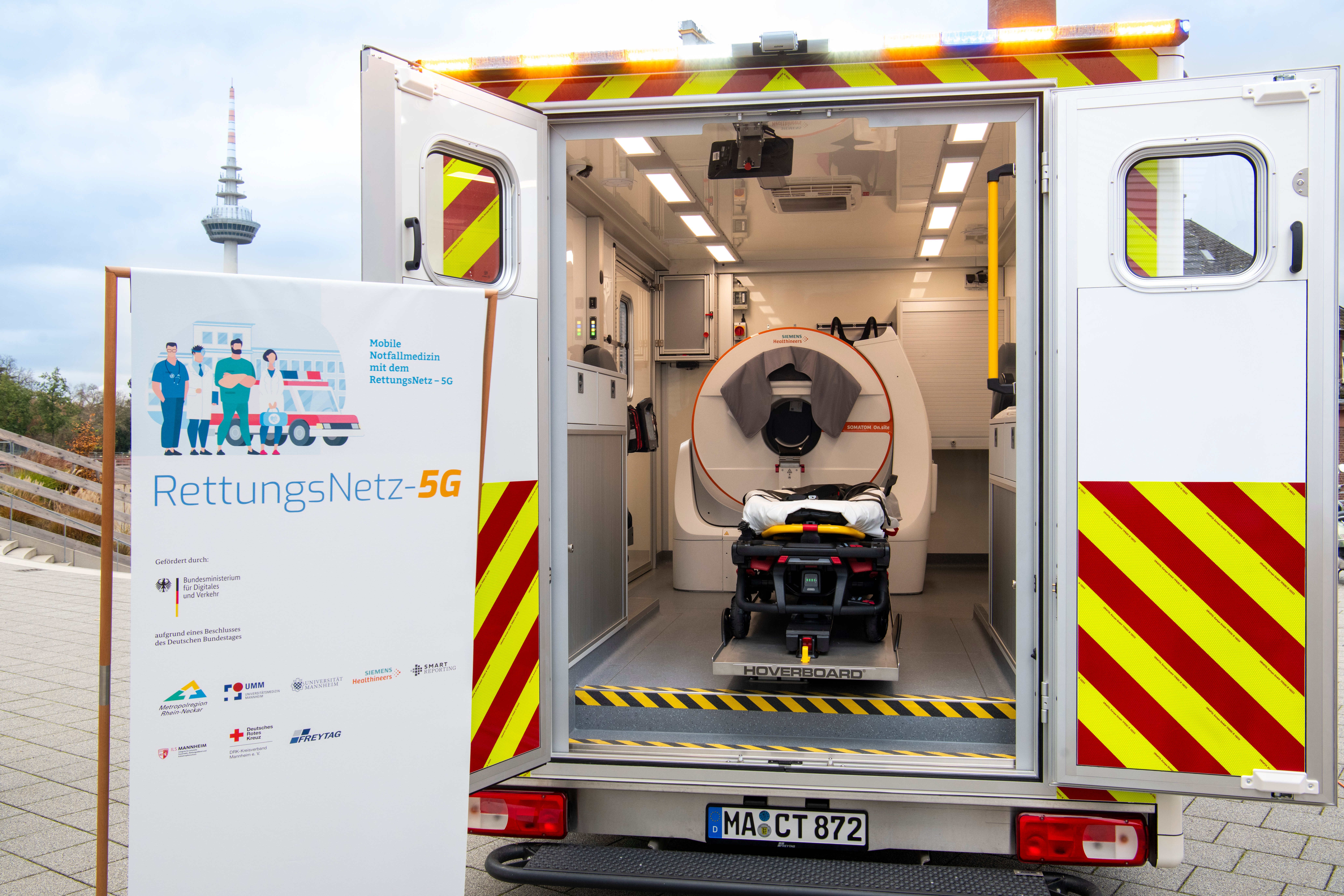1 min read
Smart Reporting to Acquire Fluency for Imaging: uniting to create Jacobian
Munich, Germany / Pittsburgh, USA – October 15, 2025.Smart Reporting, a pioneer in AI-powered diagnostic reporting, has entered into a definitive...
A major milestone has been achieved in emergency medical care with the successful launch of the Mobile Stroke Unit (MSU) as part of the RettungsNetz-5G project, a groundbreaking initiative that promises to save lives and revolutionize emergency medical response. After more than two years of collaboration between key healthcare, technology, and research institutions, Smart Reporting is proud to have played a critical role in this life-saving innovation.
The RettungsNetz-5G project, a collaboration between Verband Region Rhein-Neckar, Universitätsmedizin Mannheim (UMM), Siemens Healthineers, Freytag Karosseriebau, DRK-Kreisverband Mannheim e.V., the Integrierte Leitstelle Mannheim (ILS), and the Institute for Enterprise Systems (InES) at the University of Mannheim, aims to harness the power of 5G mobile technology to radically improve emergency healthcare delivery. The primary objective: faster, more accurate diagnostics and treatment for patients in critical conditions like strokes and heart attacks.
The Power of 5G and AI in Emergency Medical Care
The integration of 5G mobile networks, artificial intelligence (AI), and remote technologies into emergency care workflows marks a new era of innovation in healthcare. Until now, mobile networks have struggled with limited bandwidth and unreliable data transmission speeds, especially in high-demand urban settings. The introduction of 5G, with its low-latency, high-bandwidth capabilities, overcomes these challenges, enabling near-instantaneous, bidirectional data transmission—crucial for providing timely care.
At the heart of this transformation is the Mobile Stroke Unit (MSU), an advanced mobile clinic equipped with real-time CT imaging, AI-based diagnostics, and live video communication to bridge the gap between paramedics on the scene and specialists in the hospital. With 5G technology, diagnostic images, such as CT scans, can be transmitted almost instantly to healthcare professionals, even before the patient reaches the hospital, facilitating early treatment initiation.
Smart Reporting’s Role: AI-Powered Stroke Diagnostics
Smart Reporting’s involvement is a key part of the project’s success. As a specialized SME, Smart Reporting has integrated its reporting technology into the MSU to support teleradiology and teleneurology for stroke patients. The company’s software automates the creation of structured, AI-enhanced reports based on data such as live CT scans, ECG readings, and clinical photos. By integrating with Siemens Healthineers' software systems, Smart Reporting ensures seamless transfer of critical medical data into standardized, actionable reports.
The automated reporting system significantly reduces the time needed for diagnosis and treatment. For stroke patients, where every minute counts, the ability to produce accurate, data-driven reports within seconds means that physicians can make informed treatment decisions much earlier, improving patient outcomes.
“We are thrilled to be part of this innovative project, which pushes the boundaries of what’s possible in emergency care,” said Philipp Matthies, Innovation Solutions Architect at Smart Reporting. “Our technology enables quick, structured reporting of critical patient data, helping doctors make rapid decisions that can ultimately save lives. It’s an honor to contribute to such an impactful project alongside our esteemed partners. We’re looking forward to support emergency stroke reporting and other clinical use cases in the Rhein-Neckar region.”

Copyright: VRRN Schwerdt
The Path to Life-Saving Technology
The MSU’s implementation is just the beginning. RettungsNetz-5G is developing a nationwide, scalable platform that will eventually connect hospitals, rescue teams, and other emergency services, enabling real-time collaboration on a massive scale. As the project advances, mobile CT units and robotic interventions powered by 5G will further enhance the ability to diagnose and treat severe injuries or medical conditions on-site, reducing treatment delays and improving overall patient care.
In particular, the use of mobile CT scanners connected to AI-powered decision platforms will allow stroke and heart attack patients to receive life-saving interventions much earlier, while remote-controlled emergency robotics could soon assist in complex procedures like interventional radiology directly at the scene.
Looking Ahead: A Healthier Future with 5G
The advancements made through RettungsNetz-5G offer more than just faster treatment times—they promise to save lives by improving decision-making, enabling early intervention, and ensuring that patients receive the right care at the right time. For Smart Reporting, being a part of this transformative initiative has reinforced its mission to support healthcare providers in delivering the most efficient and effective care possible.
1 min read
Munich, Germany / Pittsburgh, USA – October 15, 2025.Smart Reporting, a pioneer in AI-powered diagnostic reporting, has entered into a definitive...
2 min read
Munich, Germany – May 12 , 2025 – Smart Reporting GmbH, a global leader in AI-powered diagnostic reporting, today announced a strategic partnership...
2 min read
Empowering Radiology with AI: Smart Reporting’s Context-Aware Approach to Automated Reporting
Bringing Intelligence into Structure – and Structure...
